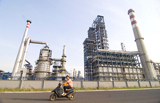China has outlined plans for revitalizing and restructuring its light industries and often loss-making oil refining sector, in the government’s latest effort to help create jobs and boost economic growth.
The plans, issued by the State Council late on Monday and posted on the government’s Web site, are aimed at creating about 3 million jobs and helping manufacturers weather a sharp downturn in export demand amid the global financial crisis.
The measures are typical of the Chinese Communist Party’s penchant for grand, multiyear economic plans.

PHOTO: EPA
However, the government gave no specific dollar amount for the programs and it was unclear whether or not some costs are included in a 4 trillion yuan (US$586 billion) economic stimulus package announced late last year, which focused on construction projects.
The outline for the refining sector calls for raising crude oil processing capacity by about 18 percent from last year to 405 million tonnes a year by 2011.
By then, China plans to build three or four major refineries in the Yangtze River Delta, near Shanghai, and the Pearl River Delta, near Hong Kong in southern China, the notice by the State Council said.
Each plant would be able to process 20 million tonnes of crude oil per year, it said.
Meanwhile, existing refineries will be upgraded to become less polluting, with energy efficiency to be improved and discharges of waste water and sulfur dioxide to fall by more than 6 percent.
Chinese refineries processed more than 342 million tonnes of crude oil last year, while much of the country faced chronic shortages of diesel and gasoline, particularly before growth slowed late in the year.
Soaring crude oil prices left major refiners with massive losses because of price controls that prevented oil companies from passing on higher costs for oil imports to end users.
The government’s plans for the light industrial sector, also issued on its Web site, also did not include any financial details.
They call for upgrading technology and providing more support for small and medium-sized businesses that dominate the sector but suffer from a lack of access to back loans and other financing.
Light industries such as home appliance, apparel, shoe, furniture and plastics products makers employ some 35 million people and once dominated China’s export sector.
But thousands of such factories have closed amid the global downturn and many of those remaining need upgrading and improved environmental protection.
“At the same time that our light industry has grown very quickly, some long-term, acute contradictions and problems have emerged,” the plan said.

The CIA has a message for Chinese government officials worried about their place in Chinese President Xi Jinping’s (習近平) government: Come work with us. The agency released two Mandarin-language videos on social media on Thursday inviting disgruntled officials to contact the CIA. The recruitment videos posted on YouTube and X racked up more than 5 million views combined in their first day. The outreach comes as CIA Director John Ratcliffe has vowed to boost the agency’s use of intelligence from human sources and its focus on China, which has recently targeted US officials with its own espionage operations. The videos are “aimed at

STEADFAST FRIEND: The bills encourage increased Taiwan-US engagement and address China’s distortion of UN Resolution 2758 to isolate Taiwan internationally The Presidential Office yesterday thanked the US House of Representatives for unanimously passing two Taiwan-related bills highlighting its solid support for Taiwan’s democracy and global participation, and for deepening bilateral relations. One of the bills, the Taiwan Assurance Implementation Act, requires the US Department of State to periodically review its guidelines for engagement with Taiwan, and report to the US Congress on the guidelines and plans to lift self-imposed limitations on US-Taiwan engagement. The other bill is the Taiwan International Solidarity Act, which clarifies that UN Resolution 2758 does not address the issue of the representation of Taiwan or its people in

US Indo-Pacific Commander Admiral Samuel Paparo on Friday expressed concern over the rate at which China is diversifying its military exercises, the Financial Times (FT) reported on Saturday. “The rates of change on the depth and breadth of their exercises is the one non-linear effect that I’ve seen in the last year that wakes me up at night or keeps me up at night,” Paparo was quoted by FT as saying while attending the annual Sedona Forum at the McCain Institute in Arizona. Paparo also expressed concern over the speed with which China was expanding its military. While the US

SHIFT: Taiwan’s better-than-expected first-quarter GDP and signs of weakness in the US have driven global capital back to emerging markets, the central bank head said The central bank yesterday blamed market speculation for the steep rise in the local currency, and urged exporters and financial institutions to stay calm and stop panic sell-offs to avoid hurting their own profitability. The nation’s top monetary policymaker said that it would step in, if necessary, to maintain order and stability in the foreign exchange market. The remarks came as the NT dollar yesterday closed up NT$0.919 to NT$30.145 against the US dollar in Taipei trading, after rising as high as NT$29.59 in intraday trading. The local currency has surged 5.85 percent against the greenback over the past two sessions, central